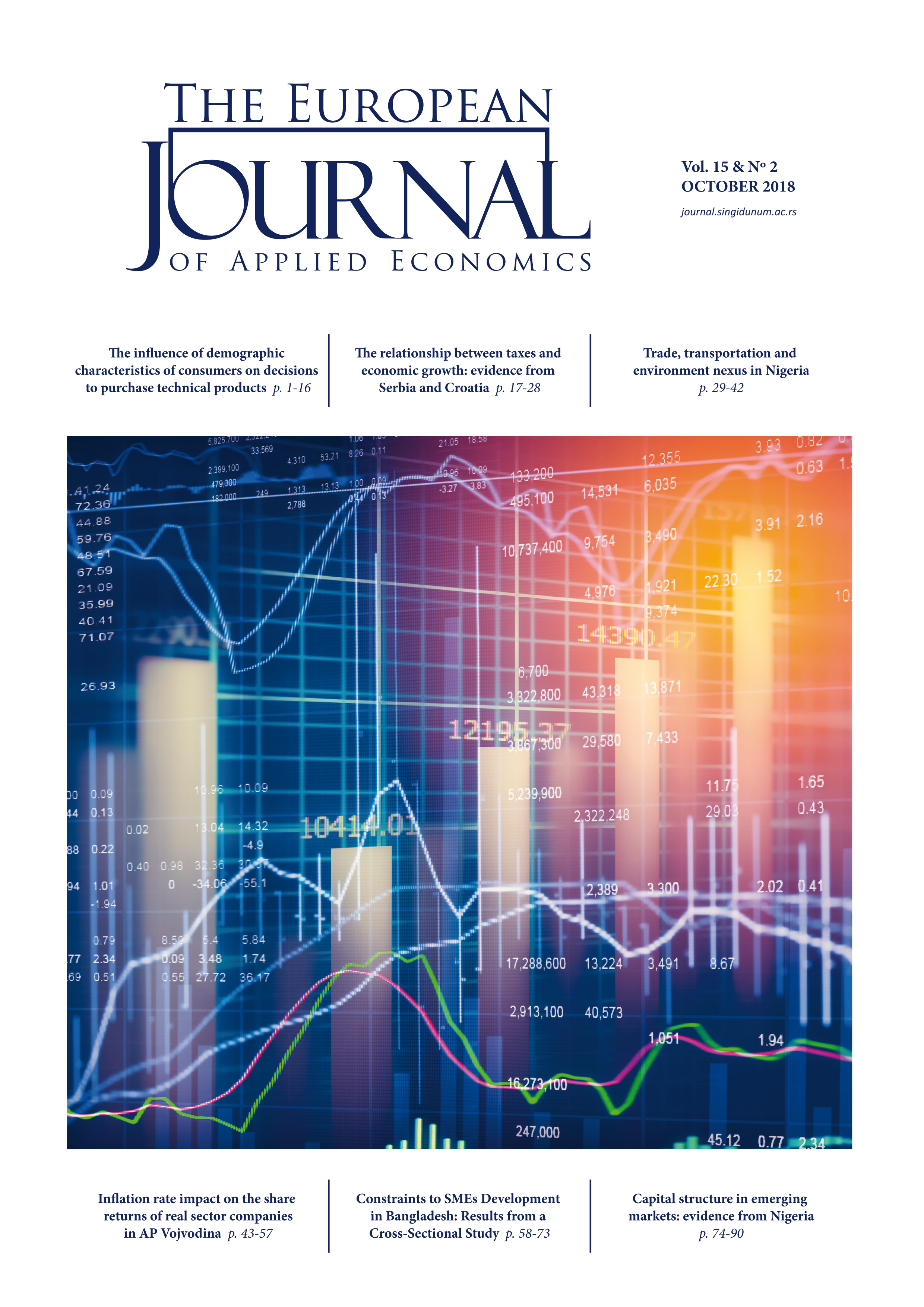The relationship between taxes and economic growth: evidence from Serbia and Croatia
Sažetak
This study presents an empirical analysis of taxes and economic growth
in Serbia and Croatia in the period 2007-2016. In order to identify the
impact of tax forms on economic growth and their relationship, the
authors decided to set up a panel regression where gross domestic
product is the dependent variable, while corporate income tax, value
added tax, social security contributions and excises are independent
variables. The results of random effect model have shown that corporate
income tax, value added tax and social security contributions have a
positive impact on the gross domestic product, while excises affect the
gross domestic product negatively. However, only value added tax has
a statistically significant impact on economic growth in these countries,
with each increase in revenue from this tax contributing to the growth
of gross domestic product in the observed period.
Reference
Alesina, A., & Ardagna, S. (2010). Large changes in fiscal policy: taxes versus spending. Tax Policy and the Economy, 24, 35-68. DOI: 10.3386/w15438
Angahar, P. A., & Alfred, S. I. (2012). Personal income tax administration in Nigeria: challenges and prospects for increased revenue generation from self employed persons in the society. Global Business and Economics Research Journal, 1(1), 1-11.
Aničić, J., Laketa, M., Radović, B., Radović, D., & Laketa, L. (2012). Tax policy of Serbia in the function of developing the economic system. UTMS Journal of Economics, 3(1), 33-43.
Anyanwu, J. C. (1993). Monetary Economics: Theory, Policy and Institutions. Onitsha, Nigeria: Hybrid Publishers.
Appah, E., & Oyandonghan, J.K. (2011). The Challenges of Tax Mobilization and Management in the Nigerian Economy. Journal of Business Administration and Management, 6(2), 128-136.
Arbutina, H. (2000). Value Added Tax in Croatia - An (Almost) Perfect Tax in an Imperfect Environment. Revenue Law Journal, 10(1), 107-118.
Arnold, J., Brys, B., Heady, C., Johansson, A., Schwelnuss, C., & Vartia, L. (2011). Tax Policy for Economic Recovery and Growth. The Economic Journal, 121(550), 59-80. DOI:10.1111/j.1468-0297.2010.02415.x
Bania, N., Gray, J., & Stone, J. (2007). Growth, taxes and government expenditures: growth hills for U.S. states. National Tax Journal, 60(2), 193-204.
Barro, R., & Redlick, C. (2011). Macroeconomic Effects of Government Purchases and Taxes. Quarterly Journal of Economics, 15369, 51-102. DOI:10.3386/w15369
Bhartia, H. L. (2009). Public Finance. New Delhi: Vikas Publishing House PVT Ltd.
Chigbu. E.E, Akujuobi, L. E., & Appah, E. (2012). An Empirical Study on the Causality Between Economic Growth And Taxation in Nigeria. Current Research Journal of Economic Theory, 4(2), 29-38.
Chigbu, E.E., & Njoku, C.O. (2015). Taxation and the Nigerian Economy: (1994-2012). Management Studies and Economic Systems, 2(2), 111-128.
Ferede, E., & Dahlby, B. (2012). The impact of tax cuts on economic growth: Evidence from the Canadian provinces. National Tax Journal, 65(3), 563-594.
Gale, W., Krupkin, A., & Rueben, K. (2015). The Relationship between Taxes and Growth at the State Level: New Evidence. National Tax Journal, 68(4), 919-942.
Gemmell, N., Kneller, R., & Sanz, I. (2011). The Timing and Persistence of Fiscal Policy Impacts on Growth: Evide-nce from OECD Countries. The Economic Journal, 121(550), 33-58. DOI:10.1111/j.1468-0297.2010.02414.x
Helms, L.J. (1985). The Effect of State and Local Taxes on Economic Growth: A Time Series Cross-Section Approach. Review of Economics and Statistics, 67(4), 574-582. DOI:10.2307/1924801
Ibadin, P.O., & Oladipupo, A.O. (2015). Indirect taxes and economic growth in Nigeria. Ekonomska misao i praksa, 2, 345-364.
International Monetary Fund. (2018). IMF country information. Retrieved April 17, 2018, from http://www.imf.org/external/country
Kalaš, B., Pjanić, M., Milenković, N., & Andrašić, J. (2016). Comparative Analysis Paying Taxes Indicator: Evidence from Western Balkans Countries and Turkey. International Journal of Management, Accounting and Economics, 3(4), 222-232.
Lee, Y., & Gordon, R. (2005). Tax Structure and Economic Growth. Journal of Public Economics, 89(5-6), 1027-1043. DOI:10.1016/j.jpubeco.2004.07.002
Mankiw, G., Weinzierl, M., & Yagan, D. (2009). Optimal Taxation in Theory and Practice. Journal of Economic Perspectives, 23(4), 147-174. DOI:10.3386/w15071
McBride, W. (2012). What is the Evidence on Taxes and Growth? Tax Foundation, Special Report 207, December 18, 2012.
Mitra, P., & Stern, N. (2003). Tax systems in transition. World Bank Policy Research Working Paper 2947. Washington, DC: The World Bank.
Myles, G. (2000). Taxation and Economic Growth. Fiscal Studies, 21(1), 141-168.
DOI:10.1111/j.1475-5890.2000.tb00583.x
Nerre, B., Dragojlović, A., Ranđelović, S., & Đenić, M. (2014). Tax reform in Serbia: Experiences and perspectives. In Tax Reforms: Experiences and Perspectives: Conference Proceedings, 20 Jun 2014 (pp. 79-96). Zagreb: Institute of Public Finance.
Onakoya, A.B., & Afintinni, O.I. (2016). Taxation and economic growth in Nigeria. Asian Journal of Economic Modelling, 4(4), 199-210.
Padovano, F., & Galli, E. (2001). Tax rates and economic growth in the OECD countries (1950-1990). Economic Inquiry, 39(1), 44-57. DOI: 10.1111/j.1465-7295.2001.tb00049.x
Pere, E., & Hashorva, A. (2011). Tax Systems in West Balkans Countries. Romanian Economic and Business Review, 6(2), 80-94.
Ranđelović, S. (2008). Dual Income Tax - An Option for the Reform of Personal Income Tax in Serbia? Economic Annals, 178/179, 183-197.
Ranđelović, S. (2010). Unapređenje performansi poreskog sistema Srbije kroz reformu poreza na dobit. In Poreska politika u Srbiji: Pogled unapred (pp. 75-94). Beograd: USAID Sega projekat. (In Serbian).
Reed, R. (2008). The robust relationship between taxes and U.S. state income growth. National Tax Journal, 61(1), 57-80.
Romer, C., & Romer, D. (2010). The Macroeconomic Effects of Tax Changes: Estimated Based on a New Measure of Fiscal Shocks. American Economic Review, 100(3), 763-801. DOI:10.3386/w13264
Salami, G.O., Apelogun, K.H., Omidiya, O.M., & Ojoye, O.F. (2015). Taxation and Nigerian economic growth. Research Journal of Finance and Accounting, 10(6), 93-101.
Stevanović, M., & Gajić, A. (2013). Analysis of development of the tax system in Serbia. Annals of the Oradea University, 2, 300-304.
Šimović, H., Blažić, J., & Štambuk, A. (2014). Perspectives of tax reforms in Croatia: expert opinion survey. Financial theory and practice, 38(4), 405-439. DOI:10.3326/fintp.38.4.2
Tomljanovich, M. (2004). The role of state fiscal policy in state economic growth. Contemporary Economic Policy, 22(3), 318-330. DOI:10.1093/cep/byh023
Tosun, M.S., & Abizadeh, S. (2005). Economic growth and tax components: An analysis of Tax changes in OECD. Applied Economics, 37(19), 2251-2263. DOI:10.1080/00036840500293813


